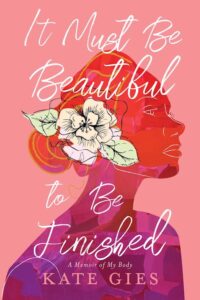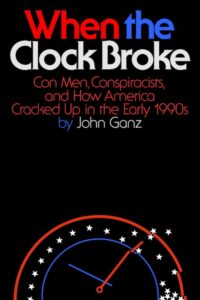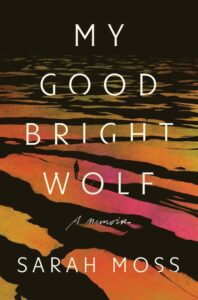February 9, 2025
My Story on the ABORSH Podcast
Thank you, Rachel Cairns, for making my abortion story part of Season Two of the Aborsh Podcast. You can listen on Spotify or Apple Podcasts, or wherever you get your podcasts.
February 5, 2025
It Must Be Beautiful to Be Finished, by Kate Gies
Before her second surgery at age five (there would be 14 surgeries in total), Kate Gies had learned to somersault, somersaulting becoming her preferred mode of transport at home: “Bend, tuck head to chest, pull forward, and roll! Like a wheel!” But after the surgery—during which a plastic ear was inserted under grafted skin; Gies was born without a right ear and this replacement would be cosmetic only—she would experience pain from motion as simple as moving her head to one side in her sleep, so there would be no more somersaults. The plastic ear wouldn’t take either, and doctors’ further attempts to deliver on promises of building her ear would be far from straightforward, until finally—at age 14—Gies put a stop to all of it, deciding she preferred living in her body as it was, rather than trying to have two ears, rather than trying to be what she calls, “The Kate I’m Supposed to Be.”
Although that is not the end of the story, the trajectory not so simple, not least of all because Gies is hearing impaired (she has no hearing where she has no ear [obviously!], and her hearing on the other side was compromised following a punctured eardrum from one of many surgeries gone wrong), but spends the next 20 years not considering her disability and the need for accommodation. Instead, “[m]y problem had always been perceived as the physical deformity of the missing ear. Its form was the problem, not its function: what I looked like, not the ease with which I took in an navigated the world.”
The catalyst for Gies’ memoir, IT MUST BE BEAUTIFUL TO BE FINISHED, is the discovery of a lesion on her right earlobe, the earlobe constructed from tissue from her stomach during those childhood surgeries, the ear that she never thinks about, doesn’t touch, disassociated from this part of her body, and still traumatized from the brutal medical procedures she’d suffered during the years doctors spent trying to make her complete. The memoir documents her movement toward finally the facing the reality of her body and of her history full, a journey told in vignettes and fragments from the past.
The fragmented structure of the memoir is emotionally helpful for the reader, because reading it is such a visceral and wrenching experience, and the story in pieces makes that easier. It’s also how memory works, flashes and splinters, and Gies’s memoir is a fascinating exercise in reconstructing history too, the writing including excerpts from her medical records and also feedback from Gies’s mother upon hearing what she’d written, offering corrections and extra insight, her own pivotal point of view. (Gies recalls her mother being extra cheerful before her surgeries at The Hospital for Sick Children in Toronto; her mother tells her how once Gies had been delivered to surgery, she’d have to find a place to cry.)
In addition to Gies herself, who appears to have been born with her somersaulting spirit fully formed, her mother emerges as the hero of this book, standing up for her daughter within a system that offered them very little agency, setting the kind of example that likely empowered Gies to eventually declare herself finished with surgeries—a decision her mother never questioned. Their back-and-forths are one of the most moving parts of this book, her mother’s honest self-criticism, Gies’ generosity in imagining herself into her mother’s perspective in the most stunning and powerful fashion. (I think it was because I was able to relate so strongly to both characters that I found reading this book so incredibly moving, in a way that was sometimes painful, but also a gorgeous testament to what writing can do.)
In telling the story of her own experience in an ableist and misogynist medical system, Gies illuminates broader truths about what it means to have a body, to live with difference, and learn to finally feel at home within one’s skin. I loved this book so much.
February 4, 2025
Talking Politics
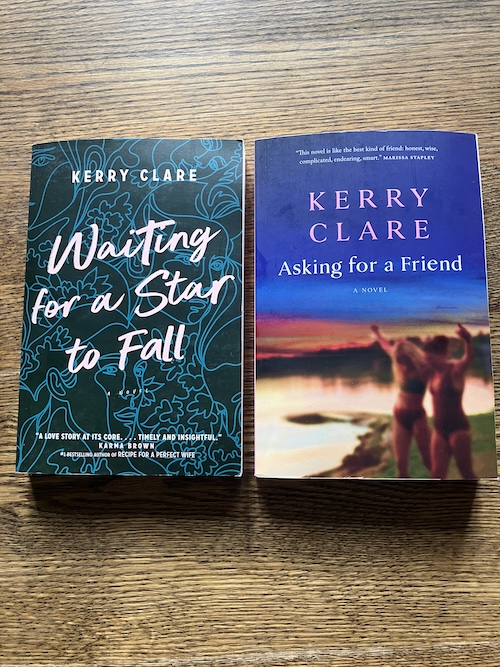
I’m so proud to have published these two unabashedly political novels, grateful for every instance in which those novels have been received in that context, and still a little bit disappointed that it hasn’t happened more often, because making these issues and ideas—about consent, and power, and reproductive rights—accessible to readers was huge part of why I wrote these books in the first place. It’s disappointing to me that “politics” is so often seen as siloed, male, serious and tidy, dry and impersonal, detached from our bodies, our families, the hamster wheels of our everyday lives.
At this moment where politics as usual has seemingly jumped the shark, however, I feel heartened by two really beautiful instances of these novels entering the discourse. On the January 28 episode of the Aborsh podcast, Elizabeth Renzetti (whose new book WHAT SHE SAID: is essential reading) mentions ASKING FOR A FRIEND as an example of positive abortion representation in media (along with SEX AND THE CITY!): “[The book] starts with an abortion and it’s about how that abortion shapes, the friendship between the two protagonists. And it’s just a really interesting way of looking at how abortion brings the two women together and becomes a shared experience.”
And WAITING FOR A STAR TO FALL will be the BEYOND A BALLOT Book Club pick for February 27, which I’m really looking forward to. BEYOND A BALLOT, whose mission is to get more Canadian women interested in politics, brings together really interested group of politically-minded thinkers, and I hope that my novel makes for fruitful discussion and meaningful questions (which are always more important than having the answers).
February 4, 2025
Olive Kitteridge and #WinterofStrout
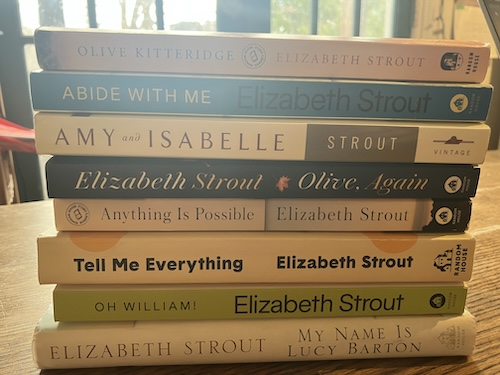
As I wrote about in my January essay, 2025 is my #WinterofStrout, a project that was born by a comment a friend made in our group chat when we were once again marvelling about Elizabeth Strout’s Lucy Barton books, a proposal to (re)read them all, which I thought seemed like such a fantastic idea, mostly because there are many books by Strout I still had yet to read AND my initial encounters with her books had been such MISreadings. I first read Olive Kitteridge in 2013, and enjoyed it, but had avoided it for years before that thinking it was hokey and middlebrow, and in some ways I wasn’t even wrong, and I certainly wasn’t moved enough by it to pick up Strout’s 2019 follow-up Olive, Again, although that was probably because I’d read another novel by her, My Name is Lucy Barton, in 2016, and been so extraordinarily unmoved (and even desirous of my money back—the book seemed slight, unfinished, not enough).
I also didn’t properly understand how both books could be by the same author, or just who this Elizabeth Strout person was anyway, who invented characters with definitive names that usurped her own in reader consciousness. Not thinking very much about any of it at all, until I went back to Lucy in 2023 and found myself besotted. In some ways, still, My Name is Lucy Barton was not enough, okay (though I could make a good argument against that now, especially having seen it performed as a one woman show), but in connection with Strout’s other works—both those books with Lucy’s voice at the centre and others—there is so much life going on. “Strout’s books are less an exercise in narrative than one of character, and its variable layers, and the connections between them, and between places, ideas, and things.”
I love a reading project, the way these books give shape, structure, and context to my own ordinary experiences. My #WinterofStrout began with her debut novel, Amy & Isabelle, which I read in December and completely enjoyed, impressed by how Elizabeth Strout was Elizabeth Strout right out of the gate, fully formed, and thinking about that line from Lucy Barton about how everyone has just one story, really, and they keep telling it over and over, and that Strout’s for certain is mothers and daughters, mothers and daughters. Although this was less apparent in her second novel, Abide With Me, which read on Christmas Eve, this one a story about a father, a widower, whose troubled daughter would grow up to be Bob Burgess’s friend, social worker friend Katherine Caskey, who shows up in later Strout novels. Abide With Me is a novel about marriage, faith, despair, about the failures of community, about the unknowability of others’ experiences (which perhaps is Strout’s actual one story). About the spots of goodness that save us, the miracle of that in a world where so much is otherwise.
And then it was time for Olive Kitteridge, which I’d really been looking forward to, supposing that re-encountering that book in the broader context of Strout’s work would be fascinating—it won the Pulitzer Prize after all. I was prepared to be dazzled. And reader, I was not. Which is not to say that I didn’t love the book, that I didn’t see all the richness that was there, that I didn’t find the stories in the collection so extraordinarily moving. I did! I did! Everything I love about Strout’s point of view and her fascinations and preoccupations are perfectly on display here, but, I’d had this idea of Strout as an author who “doesn’t write novels so much as chart constellations, connecting points of light, moments of grace.” And really was quite sure that this skill would be on full display in this “novel in stories,” and I’d be able to understand her method better than when I first read the book so many years ago.
But it would turn out that Olive Kitteridge really is, as opposed to a chart of constellations, a short story collection, and not even “a novel in stories,” which Olive does not actually purport to be on my copy, but a collection of stories almost half of which had been published in various places between 1992 and 2007 (and it’s likely I even read that earliest story in its initial publication because it was published in Seventeen, which I was an avid reader at the time). Likely Olive herself was not even present in many of the stories’ original incarnations, the ones in which Olive exists in the background, but added as Strout put the Olive Kitteridge manuscript together, which is fine, but it’s just that I’d been expecting something more organic, something more like the magic of what happens when I meet Isabelle from Amy and Isabelle in the pages of Strout’s latest novel, Tell Me Everything, but again, that’s an awful lot to ask from a book.
February 3, 2025
When the Clock Broke, by John Ganz
Today I am nostalgic for last week, when I was delightfully ensconced within the pages of John Ganz’s When the Clock Broke: Con Men, Conspiracists, and How America Cracked Up in the Early 1990s, an utterly whackadoodle story that begins with a chapter called “Swamp Creature,” about the bizarre politics of Louisiana stretching back to Napoleon, that state’s curious combination of anarchy and tyranny under figures like Huey Long, and from where David Duke emerges, freaky weirdo and KKK aficionado, in 1989 finishing first in an open primary for Louisiana’s 81st district, and would go on to serve in that state’s legislature.
Ostensibly, Ganz’s book documents the 1992 US Presidential election and its primaries (in which Duke would take part and be out of the running very early), beginning with Duke in Louisiana, finishing 300-some pages later in New York City in 1992 as crime boss John Gotti is convicted, a former state attorney named Rudolph Giuliani having brought down many prominent Mafia figures in that state—and yet all is not well, and the myth of Gotti continues to hold appeal. Americans are mistrustful of institutions, and for good reason—a decade of Reaganism has failed to benefit most families, deregulation has led to banks defaulting, a widespread recession, the rise of talk radio filling social gaps but leading to polarization, free trade seemingly taking away US jobs, police violence and devastating riots under an incredibly corrupt LAPD inflaming racial tensions, similar tensions between stoked between African-American and Jewish communities in New York City, and dividing allies on the left, not to mention the Ruby Ridge Standoff (during the which a N*zi salute is construed as an enthusiastic gesture, lest you think anything has ever been new), the Branch Davidian Siege in Waco, Texas, and other instances of extremism getting closer and closer to the American mainstream. Well known figures like Pat Buchanan and Ross Perot (who brings a Musk-ish energy to the scene) enter the chat here, two figures whose ubiquity at the time maybe undermined their strangeness, but man, they were strange, and they were only the tip of an iceberg of “paleoconservativism,” the moment that maintained that the problem with Nixon and Reagan is that they did not go far enough.
Ganz’s narrative moves at a swift pace, rich and sweeping, sparkling with memorable sentences (of Louisinana governor Edwin Edwards, he writes, “He was still a “Laissez les bons temps rouler” guy in the laissez-faire world of Reaganomics and austerity. He have have laissez-ed a little too bon of a temps.”) There is something comforting about the bonkers world he depicts, the way it gives our current moment essential context, how much less dangerous these forces are at the remove of history—and of course they were less dangerous then, still on the fringes.
But not as much on the fringes as I would have imagined. I wasn’t very old when all these events are taking place, but I remember them, their cast of characters, watching it stream on CNN, and how ordinary it all seemed from my vantage point. But that’s the way of course, how the path is laid, one thing leading to another, and the power of Ganz’s storytelling is that he doesn’t even need to make explicit the connections, the story does it for him. Donald Trump is a minor character throughout the whole book, but his presence looms large from his first appearance on page 41 when he shows on ABC News’ Primetime Live after in November 1989 just after David Duke does, Trump “ranting about Japanese investment on the US economy, under the headline, ‘Who Owns America?'”‘”
January 31, 2025
How I’m Taking Care

I used to spend so much time on the internet telling people what to do and how to be because it felt nice to believe that there was somehow a way to be immune to the struggles and foibles and terrible times that are (I’ve since realized) a pretty standard part of human experience, and also in lieu of feeling my feelings about how difficult and uncertain life can be.
This kind of didactic posturing was also the way that so many of us had been programmed to tell stories on online platforms anyway, and so that those stories were actually a manifestation of the very anxiety that these same platforms were continually fuelling in my addled brain would turn out to be somehow…awfully efficient? (LIFE HACK! HOW TO OPTIMIZE YOUR NEUROSES AND ALIENATE PEOPLE!)
So now I’ve become superstitious about dispensing any kind of advice, and the very idea of doing so makes me anxious. (What a knot this is!!)
But I’ve also been hearing from a lot of people who’ve been struggling lately, and I recognize where they are so much from where I was eight years ago, and where I would remain until I had a mental breakdown at the end of 2021. This would be my second experience of mental illness, after a bout of postpartum depression following the birth of my first child, which I didn’t recognize as depression at the time (even though everybody else did!).
In both situations, walking around perpetually weeping seemed (to me!) like a reasonable response to the difficulties/crises in the world around me at the time, both at large, and at small. “I don’t feel bad because there’s something wrong with me,” I insisted. “I feel bad because this is hard and things are terrible.” And while I wasn’t incorrect about the latter point, what I was missing was that the burden didn’t have to be so heavy. I wasn’t obligated to carry it all, and thinking that I had to had absolutely destroyed me.
Here is some of what helped me figure a lot of things out, and get me in a place of relative steadiness, where I’m so grateful to be right now.
- THERAPY: Therapy has changed my life, and given me the tools to meet this moment.
- SLEEP: My mental wellness is irrevocably connected to being well rested. When I am tired, everything is impossible and anxiety-inducing. And when I am anxious, sleep is really hard. What got me out of my crisis in 2021 was meds that calmed my brain and let me sleep, and ended my panic. (Also, don’t use your smartphone after 9pm or sooner than 30 minutes after you wake up in the morning)
- LET GO OF THE VIGILANCE: But even before I’d hit my crisis point, I’d got a glimpse of where I was going so wrong when I read an Instagram post from the writer Katherine May, who has spent a lot of time interrogating the ideas that got treated as dogma in progressive online spaces. That her message came as such a revelation (and relief) seems strange now, but it really shifted my thinking. She’d written about how none of us were obliged to watch over the whole world. Yes, there was a part of it that we were all responsible for, those things close to home, but this sense of needing to keep vigilance over our huge and wondrous planet is an awful lot to ask of an ordinary person. You don’t have to do it. Breathe, and let it go.
- MAKE FRIENDS WITH UNCERTAINTY: The vigilance had been important because it seemed like control. Turned out, I was not in control. (WHAT???) She’s a cliche, but reading Pema Chodran helped me find this less agonizing. As always, it’s a process.
- FAREWELL TO SOCIAL MEDIA: I watched the first entire Trump presidency unfold on my Twitter feed, refreshing over and over, and it made me terrified, furious, and powerlessly beholden to an app which was absolutely manipulating my feelings and emotions. I’m so angry about that now. When he won again in November, I took Instagram off my phone, and while I still download it to use once or twice a week, I delete it immediately after. Because these apps are not worthy of my attention and my being, and they are sending a no more meaningful news update than a glance out my window does. In fact, that glance may be truer and more essential than any app I’ve ever refreshed. I do not need everyone else’s feelings and anxieties in my brain, voices which drown out my own thoughts, with so much fear and speculation. It’s a terrible way to read the world, and not a meaningful form of engagement.
- REDISCOVER MY FOCUS: I am enjoying writing essays on Substack, and reading other people’s essays and blog posts in a variety of places, because all of this requires sustained focus, which is so much more satisfying and meaningful than the world in 280 characters. Same with reading actual books. (And hot tip, saying Farewell to Social Media frees up so much time for books!)
- FIND THE NEWS IN PLACES THAT DON’T MAKE ME FEEL TERRIBLE: Another hot tip, if I paid no attention to the news at all, the world would keep turning and we’d all be fine. But I’m also interested in the world, so I follow the news, but I follow in a measured fashion, with an awareness that often “the news” is somebody telling me what to think, and fear, and feel. I used to wake up every morning with my clock radio alarm playing CBC World Report, until opening my eyes to a daily soundtrack of sadness and disaster became untenable, and now I wake up to whatever song they’re playing on Classical FM instead. I read the news on paper at the weekends. I (somewhat obsessively!) listen to political podcasts that contextualize what’s going on. I receive the Guardian Weekly magazine in my mailbox once a week. I read newspapers online, but sparingly. I DO NOT READ THE COMMENTS. I don’t read Reddit Threads. I have enough trouble with my own anxiety, so don’t need everybody else’s. I also remind myself that my experience of being in the world is as real and meaningful as whatever stories The News is telling me. So are the stories on a site like Fix the News. (Listen here to founder Angus Hervey’s interview with Matt Galloway on CBC’s The Current)
- CONNECT WITH PEOPLE IN MEANINGFUL WAYS: Group chats. Get-togethers with friends. I’ve joined a singing group. I write my neighbourhood’s community newsletter. Participating in a fundraiser for my local food bank. Going to the movies. When people ask me to show up, I aspire to always say YES (unless I don’t want to).
- MAKE PLANS FOR FUN THINGS: Booking campsites for summer. Purchasing theatre tickets (do you know about the Stratford Festival’s Bravo Zone?) I go swimming every day because it’s my favourite thing. Pencilling coffee dates into the calendar. Things to look forward to. At my lowest, I’ve had trouble believing in such thing as a future, and so mapping mine out can actually me a wild and subversive thing
- DO WHAT YOU CAN: Pick a few places to put your money and time. (I am big on The Nature Conservancy of Canada, Action Canada, and The Toronto Public Library Foundation.) But remember again, you don’t have to hold it all.
(A song we sang yesterday at singing group)
January 29, 2025
Remarkable Debuts: What I Read on my Winter Vacation
Anita Brookner, Margaret Laurence, Elizabeth Strout (#WinterofStrout), Carol Shields, Barbara Pym, and more vintage treasures (including trigonometry?)
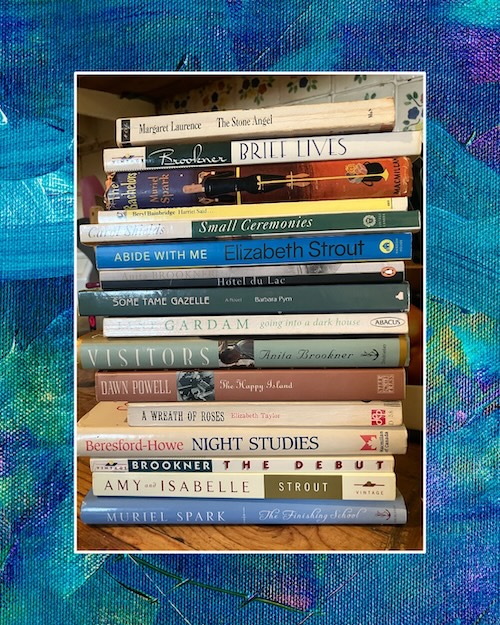
December marked the dawn of my Anita Brookner era, arriving with her first novel, published in 1981, appropriately titled The Debut (although only in North America—it was A Start in Life in her native UK). My copy was a Vintage Contemporaries edition obtained at the Vic College Book Sale, and when I started reading and loved it immediately—the opening line is “Dr. Weiss, at forty, knew that her life had been ruined by literature.”—this was the solution to a grave problem that had plagued me in 2024.
The problem being that I’d spent the last 20 years buying all the books in secondhand bookshops and now there was nothing left, save for The Pilot’s Wife, A Million Little Pieces, and a box of dusty National Geographics. How dispiriting to visit the Oxfam Bookshop in Lancaster, UK, last April and emerge with bubkes, especially after years of the seemingly infinite backlists of Laurie Colwin, Barbara Pym, Margaret Drabble, Penelopes Mortimer Lively and Fitzgerald, Alice Thomas Ellis, Jane Gardam, (most recently) Sue Miller, and so many favourites.
I don’t know why I’d never read Anita Brookner, especially since secondhand copies of her books are widely available. She hadn’t started out so long ago that the books aren’t still around, but not so recently either that they’d come back into vogue. She was prolific, publishing a novel annually for 22 years after beginning at age 53 (and she’d publish two more, in 2005 and 2009). She was also spoken of in the company of Barbara Pym, as Brookner similarly wrote mostly of women outside the conventions of marriage and motherhood.
But maybe I had been put off by how any comparison between the two writers always slighted Pym (“Brookner’s ambitions exceed those of Pym’s genteel novels of manners and place her outside that genre…” from the back of my copy of The Debut). I’d also been intimidated by Brookner’s author photo and how her hair was like a helmet, and I’d had this impression that she was a generation younger than she actually was (she was born in 1928), mostly because her author photos never changed or softened as she aged, and certainly her hair didn’t.
And then I discovered that I had read Anita Brooker before. After falling in love with The Debut, with its curious combination of humour, pathos and absurdity, and then buying and reading her 1997 novel The Visitors (a beautiful hardcover first edition, though I didn’t like it as much as The Debut; I read somewhere that Brookner’s books might have been stronger had she slowed down a bit, and maybe it’s true), I returned to the secondhand bookstore and bought two more Anita Brookners—thereby robbing myself of one of my great year-end pleasures, which is seeing my to-be-read shelf depleted, but here in my Brookner era it only grows. And that is fine.
One of these later purchases was Brookner’s Brief Lives which, I realized (via a keyword search in my blog archive), I’d read and reviewed more than a decade ago, along with her novel Look at Me the year before that, even declaring, “There is no charm to Anita Brookner, but this, of course, is why her books [are meant to] seem more literary.” Which sounds clever, but I can’t take credit, having no recollection of the book or even its reviewer, and also disagreeing with the assertion.
And isn’t this why rereading is essential? Because of the way that our selves are formed and reformed, and how the reader I was in my early 30s was unequipped to recognize Anita Brookner’s wry and subtle charms—oh my goodness, her Booker Prize-winning Hotel Du Lac, the book I picked up next and wholly adored!—which perhaps a reader has to be in at least her mid-40s to properly understand.
It would have been a tragedy if I had remembered not being fussed about Anita Brookner, and given up on her work altogether.
This is from my January essay on Substack. Paid subscribers can read the rest here. And, as always, if you’re a longtime blog reader and can’t manage the subscription, drop me a note and I will be all too happy provide you with a complimentary one!
January 29, 2025
Gleanings

- High on the list was the need to dust.
- I often think about the way, way back. During the times when they didn’t know, or maybe they did. Times when the settling in of the darkness, the long nights, the waning sun, the short days, the cold, would have induced fear, uncertainty, not knowing. Maybe they feared the darkness was permanent, that the sun, the light, was dying. Maybe they didn’t know if a ‘January’ or a ‘July‘ would come. Long before times when they had lights to turn on when the sun went down, when they couldn’t jump ahead to the next thing, when they simply had to sit and be in the dark.
- This is probably different for everyone, but for me, the 50,000 word count mark is a giant sigh of relief—actually, let me break it down for you, because I have a minute, and you have a minute (I bet), and I like writing about writing.
- Anyway, no jealousy, you always gotta banish that stuff. Does you NO good whatever. Instead, as always, do what you can with what you’ve got. Share that. Dream more dreams. Shine where you are.
- So to that end, here’s my wish for all of us this week: that going forward, we consider ways we can engage in active resistance based in militant nonviolence, we express love rooted in justice, and we remember that kindness is a power move.
- There’s nothing like a natural phenomena to bring a city to standstill and to turn our attention to the sky, to each other, and to ourselves. Even ones as everyday as sunsets feel like an invitation from the universe to pause and pay attention
- So, I went to the mountains. And as I stood in the thin air, the dry snow underfoot, with the wind pushing against me—finally, I found the woman who would climb a mountain in my story. I understood how it gave her shape.
- I’m going to stash a bunch of things I’ve written here, and see if the utterly disconnected can be connected, because webs webs webs you know.
- Edith Wharton was born 163 years ago today, on January 24, 1862, in New York City. I’ve been rereading her autobiography, A Backward Glance (1933), enjoying her descriptions of the books she read when she was young. Forbidden to read a novel without her mother’s permission, she writes that the “wide expanse of the classics, English, French and German” stretched before her instead, and she “plunged at will” into “that sea of wonders.”
- You are capable of less than you thought, but also more—in some strange, ineffable way. You are soft and weepy and sturdy as a tree, all at the same time. You are someone who learns by attraction and by necessity because you are human, just like everybody else. And that feels far less lonely than trying to pretend (even to yourself) like you’ve got it all under control.
- But Doomsday Book is not just a historical novel, and though at times I wondered about the value of the time-travel framing, by the end I appreciated the layers Willis had added through it. The most obvious one was just the point that, for all our advances in science and medicine, we are not immune from catastrophes, including ones caused by mutating viruses. A more subtle and thought-provoking one was the interplay between the science fiction aspects of time travel and the religious beliefs of the 14th-century people Kivrin encounters, especially the priest, Father Roche, who tends Kivrin in her initial illness and then labours beside her as one by one the others around them fall victim to the plague—until his turn comes as well.
- Down the hallway to the right was a thickly carpeted staircase with a fish tank tucked against the wall by the bottom stair. It was filled with shiny, darting Neon Tetras and other tropical fish and it hummed and bubbled in a very comforting manner. Beside the fish was the regular lounge room door and a bathroom beside that. We watched telly and ate meals in the regular lounge room, uncles and aunties, grandparents and parents and all of us kids together in various configurations, saying grace and sipping soup.
- one of the things I love about the pool is that it is where I can always find my inner life.
- Goodnight Moon is really a work of experimental poetry — a fact that’s largely unacknowledged culturally (and not just because of picture books’ general low literary standing). Goodnight Moon’s ubiquity has desensitized us to its strangeness. We take this book for granted. It’s part of the background, the bright green wallpaper of an American childhood.
- To summarize, that is how I spent yesterday. I took care of myself.
- how the light returns after a particularly dark time, little by little (see 9), and how clear the stars and planets are on the cold nights. We are stardust, maybe 97%, and this is our moment.
- Because it’s Fitzgerald writing I didn’t expect any goodness to be rewarded, or for the powerful and selfish to do anything but succeed in their bullying. And, well, I was right. I do find her quite bleak and cynical a lot of the time. Even though her writing is sharp, crisp, acidic and never sentimental, which can be refreshing. She has an eye for the ways in which people reveal who they are, and the ways in which privilege corrupts. The insularity of this small town, and the ways in which those with connections rule the roost, even if they are unworthy of it, is finely drawn here.
- As the cold and darkness have descended, the stalwart readers of our silent book club groups have turned in particular earnest to books to warm and brighten the way through … And yes, I said “groups” because between two meetings this past month – one virtual and one in-person – we had representation from all of midtown, east end and west end Toronto and also Mississauga, all neighbourhoods that have groups and venues in their locales. It’s wonderful how these groups intersect – and our reading and reading lists are the better for it.
- And so we live, all bumping into each other with our needs and judgements, rules and opinions, sufferings and irritations and joys.
- I wrote SPIDER because I DO like mischief, tricks, surprises, comedy, and biggish ideas that I feel kids are more capable of enjoying than many adults might assume.
January 21, 2025
My Good Bright Wolf, by Sarah Moss
“You both had to live in a time and a place where people or at least women didn’t like themselves, or if they did, concealed their self-esteem with rigour.” —Sarah Moss, My Good Bright Wolf
My Good Bright Wolf, a memoir by Sarah Moss—the author of odd spare novels I’ve loved lately like Ghost Wall, Summerwater, and The Fell—is the kind of book that I keep talking about, and when I do, I’m served with the inevitable question, “What’s it about?” A question whose simple answer is that this is a memoir about anorexia, about how Moss’s eating disorder was born from a childhood of some depravity and would flare up again during the pandemic when she was in her mid-40s. A description that sounds interesting enough, though I confess I’d be unlikely to pick up such a book on those merits, and I only picked it up at all because Sarah Moss has become a must-read author for me, the kind of author whose books are never be “about” anything quite so straightforwardly as that.
Because her memoir is also about childhood, about being the child of parents who carry their own trauma, about the inheritance of pain, about how girls are taught to hate their unruly bodies and their unruly minds. It’s about escaping into books, and what she learned about life (and care and food and eating!) from Beatrix Potter’s tales, from Jane Eyre, Swallows and Amazons, Laura Ingalls Wilder, Little Women, Virginia Woolf, Mary Wollstonecraft, and more. It’s about growing up in a culture where you might have never met a woman who wasn’t suffering a diet, who ate what she wanted to, who didn’t hate her body, who had ever managed to be enough or not too much.
It’s a memoir about memory too, most of it written in the second person, the narration interspersed with commentary in italics by a character whose voice might well be that of the narrator’s mother, ever critiquing, undermining, suggestion it wasn’t bad as all that, that the problem was the narrator, all stories and her lies. Via these interjections and elsewhere, the narrator is hard on herself, though I admit I double down on that at times as a reader, the more contemporary parts of the memoir demonstrating the impossible mindset of someone with anorexia who refuses to relinquish their sense of control, making choices that put their life in peril. From the outside, the problem looks easy to fix, but Moss shows that the reality is much more complicated.
This is a very thoughtful memoir, a memoir about anorexia that even seems to avoid fat-phobia (the author lists Aubrey Gordon’s What We Don’t Talk About When We Talk About Fat and the podcast “Maintenance Phase” among the lists of resources), and anyone who ever had a female body or struggled with mental illness will relate to Moss’s story.
And anyone who doesn’t will still be enchanted all the same by the power of Moss’s writing and the rigorous thinking that is its underpinnings.
January 20, 2025
Showing Up
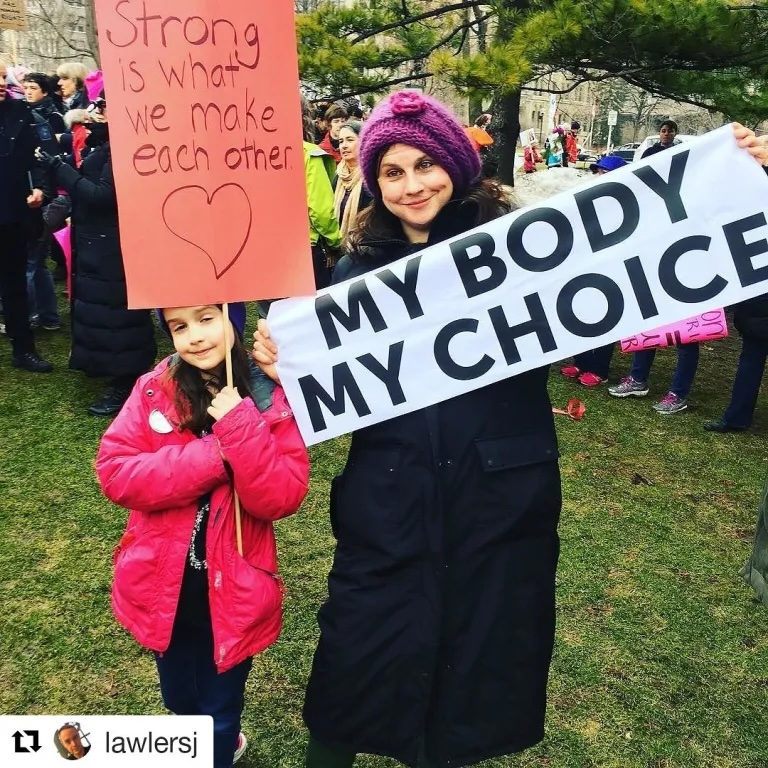
I showed up like this eight years ago, and I’m not sorry I did, but there was a whole lot I still had yet to understand about the moment I was trying to meet. Which I really did think was just a moment, one grand obstacle to be overcome, I was so utterly convinced of my righteousness, and it felt like a grand performance, utterly infused with ego: LOOK AT ME ON THE RIGHT SIDE OF HISTORY. And I wasn’t wrong about that, necessarily, but my grasp of the shape of history definitely left something to be desired. I kept thinking, “LOOK, HOW THERE ARE MORE OF US THAN YOU!” but I have come to doubt if this is a particularly good argument, especially when a convoy of people who definitely don’t share my principles tried a similar tactic in 2022, albeit with violence, implicit and otherwise. Which made me think that maybe it’s a slippery slope in which I do not want to participate, and wonder what better ways there might be to rise up in opposition.
Anand Giridharadas writes: “The first Trump presidency was a time of great and often smug certitude. He was so wrong that the contrast made us right. He was so against democracy and justice and freedom that anything we did was self-evidently heavenly. But self-righteousness corrodes the soul and the mind. And the long posture of resistance and fury and perma-vigilance has turned many of us into certitude bots instead of people of curiosity. Democracy is all about curiosity, it depends on curiosity, because it is about you and I figuring each other out and then choosing the future together, instead of the king doing it for us. But the moral clarity triggered by Trump’s vacuous viciousness lulled many of us into a dogmatic slumber. Now I see and hear around me people who are getting into a posture of real rethinking, who are returning to curiosity, who are willing to ask real and hard questions about what many of us missed and didn’t see and may not see still. Their posture is not outward but inward.”
Today, I don’t have any answers. I don’t even have a placard, but what I do have is a conversation with Heather Marshall about her 2022 bestselling novel LOOKING FOR JANE, which keeps on showing up on the bestseller list after all this time, its themes of reproductive justice and bodily autonomy continuing to resonate. The conversation is for paid subscribers on my Substack page, but the preview is available for everybody is and it’s worth checking out. Listen here!

